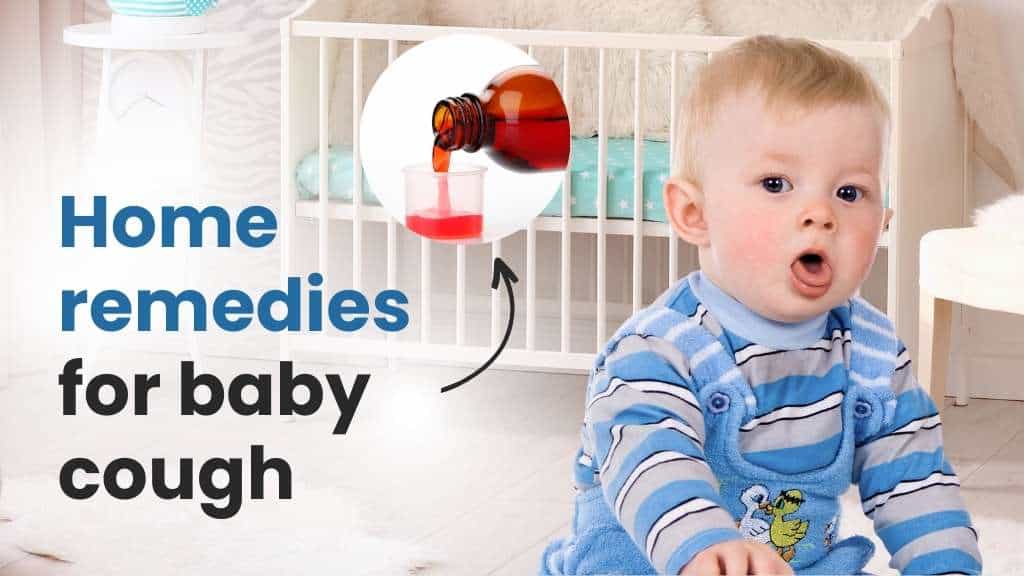
Table of Contents
When dealing with a cough or cold in adults, it’s common to rely on over-the-counter (OTC) medications to alleviate symptoms. However, this approach isn’t suitable for infants and toddlers, as cough and cold medicines deemed safe for adults can lead to severe and even life-threatening side effects in children under the age of 2.
If your baby or toddler is experiencing sniffles or a cough, consider these drug-free and safe home remedies for baby cough.
6 Home remedies for baby cough
1. Utilize Saline Drops
When your child’s nose becomes congested, it can hinder their breathing, sleep, and appetite. Saline nasal drops can help thin nasal mucus and reduce swollen airways, making it one of the most effective home remedies for baby cough. Administer them two or three times daily, being cautious not to overuse them, as this may irritate the nasal passages. Nasal saline gel can also be applied to alleviate congestion. To clear mucus from a baby’s nose, employ a nasal aspirator or a suction bulb. For toddlers who can cooperate, encourage them to blow their noses with your assistance.
2. Increase Hydration
When your child isn’t feeling well, provide more fluids than usual. It is one of the most simple and effective home remedies for baby cough. Additional fluids can help thin mucus, making it easier for them to breathe and expel phlegm. Most beverages such as water, juice, and milk are suitable. Warm liquids like chicken soup or apple juice can soothe a sore throat, but ensure they are warm, not hot, to prevent burns. Consider offering an oral rehydration solution like Pedialyte or popsicles. For babies under 6 months, stick to breast milk or formula and offer more of it when they have a cough or cold.
3. Offer Honey
Honey can provide relief for sore throats and alleviate coughs, potentially even more effectively than OTC cough medicines for children. Administer 1/2 teaspoon of honey to your child before bedtime, but refrain from giving it to children younger than one year old, as it can be harmful.
4. Use a Humidifier
Increasing humidity in the air can facilitate easier breathing and it is one of the most effective home remedies for cough in toddlers, so consider running a humidifier in your child’s bedroom during the night. Cool-mist humidifiers are safer than steam-producing models, but remember to follow the device’s cleaning instructions to prevent mold growth.
5. Manage Fevers
Some colds and coughs are accompanied by mild fevers. If your baby or toddler has a fever, follow these guidelines
- For babies under 1 month Consult your pediatrician, as fever is not typical.
- For Babies under 3 months Contact the doctor for guidance.
- For Babies aged 3 to 6 months administer acetaminophen every 4 to 6 hours as needed, adhering closely to dosage recommendations and using the provided syringe, not a household spoon.
- For Babies 6 months or older and toddlers provide acetaminophen every 4 to 6 hours or ibuprofen every 6 to 8 hours, but avoid administering both drugs simultaneously.
6. Serve Easily Swallowed Foods
Little babies and toddlers with scratchy, sore throats may be reluctant to eat due to discomfort while swallowing. Offer foods that go down smoothly. Toddlers and babies who consume solids may prefer soft, smooth options like ice pops, ice cream, pudding, flavored gelatin, yogurt, or applesauce. For those who prefer warm foods, consider chicken broth or freshly prepared pudding. Babies aged 6 months and under should stick to breast milk or baby formula.
The Takeaway - Baby Cough Remedies
When caring for infants and toddlers with coughs and colds, remember that over-the-counter medications aren’t safe for them. Instead, opt for gentle, drug-free remedies like saline drops, hydration, honey (for older children), humidifiers, and easily swallowed foods. These measures prioritize their comfort and well-being, reminding us of the importance of nurturing their health with love and care during illness.










